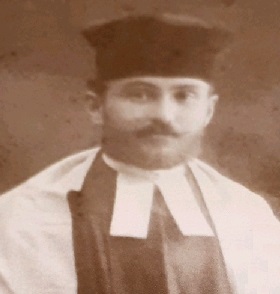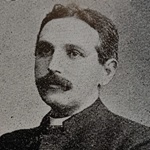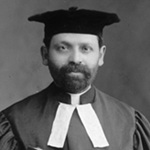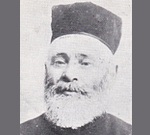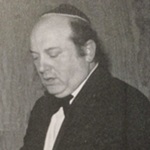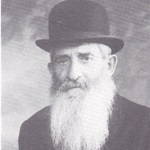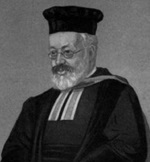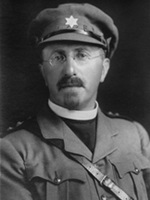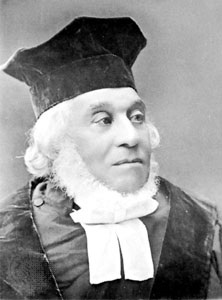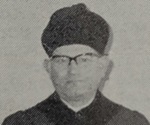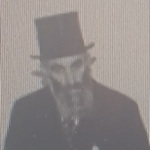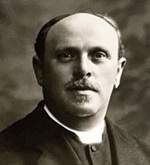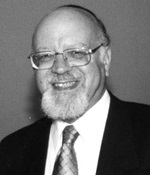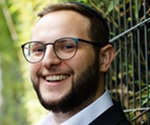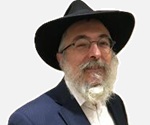|
|
||||||||||||||||||||||||||||||||||||
|
||||||||||||||||||||||||||||||||||||
|
Rabbinical Profiles(1) In most instances, if one clicks on the portrait of a minister below, an enlaged or full image will appear in a new window. Rabbi Aaron ben Moses, the scribe Rabbi Aaron (m. Rose), born in Novogrodek, Poland, was a gifted scribe, and, as such, worked in Lemberg (now Lviv, Ukraine) and Vilna. From sometime after 1700 until prior to 1705, he served as the temporary officiating rabbi for London's Askenazi community, which had recently established its own synagogue in Duke's Place in the City of London. His period of service was in the interregnum between the departure of Rabbi Judah Leib and the appointment of Rabbi Aaron Hart, who is widely regarded as Britain's first chief rabbi. Prior to his London appointment, Rabbi Aaron ben Moses was in Dublin, Ireland, where he worked as teacher and scribe and became the religious mentor and effective rabbi of Dublin's small Jewish community at its Crane Lane Synagogue. Rabbi Aaron resided in London in 1695 and it is unclear whether his sojourn in Dublin took place prior to then or whether he left for Dublin after 1695 and subsequently returned to take up the London position. (Louise Hyman's "The Jews of Ireland from Earliest Times to the Year 1910" (1962); Phillip Roth's "History of the Great Synagogue" and Derek Taylor's "British Chief Rabbis 1664-2006".) Rev. Nathan Aaron Rev. Aaron served as reader at the Oxford Hebrew Congregation in 1866 and acted as the locum reader at Cheltenham Hebrew Congregation, Gloucestershire, also in 1866. (The Jews of Oxford by David M. Lewis (1992) p.106; Hebrew Community of Cheltenham, Gloucester and Stroud by Brian Torode (1989), p.33 and Appendix.) Rabbi Monty Aaronberg Rabbi Aaronberg (m. Adele Sylvia Gita Steinfeld, December 1986, d. 29 March 1994), who studied at Gateshead Yeshiva, received semicha from Rabbi N. S. Greenspan, principal of the Yeshiva Etz Chaim, London. He served as minister at the West Hackney Synagogue, North London (c.1961-1962) and Birkenhead Hebrew Congregation (1962-c.1964), teaching also at King David High School, Liverpool. After serving at Woolwich Synagogue, south east London, in 1970 he was inducted minister at the Shepherd's Bush, Fulham and District Synagogue. In 1980 Rabbi Aaronberg became rabbi at the West End Great Synagogue, Dean Street, Soho and then at Yavneh Synagogue, South Hackney (1984-1985). Rabbi Aaronberg was for many years religious supervisor and honorary rabbi for the synagogue at the Ella Ridley Jewish Care home in Hendon, and following his death, the synagogue at the home was named in his honour. Since the home's closure, the Rabbi Aaronberg synagogue meets at the Holocaust Survivors Centre in Hendon. Rabbi Aaronberg is buried at Bushey United Synagogue cemetery, Hertfordshire. Click HERE for gallery of photographs of Rabbi Aaronberg. (JC reports, including 2 March 1962; JYB listngs; communications from family. Photograph courtesy of Rabbi Aaronberg's niece, Elisheva Richmond.)
Rev. Isaac Aarons Russian-born Rev. Isaac Aarons (m. 1907 Nellie Goodman of Merthyr Tydfill) studied at Jews' College and Trinity College, London. As a boy, he was a member of the choir of the Great Synagogue, Aldgate. He began his career as an officer of the Jewish Working Men's Club in London. In 1889 he was appointed minister and teacher of the Wolverhampton Hebrew Congregation. (In 1890, he is recorded as beimg visiting minister at Hanley Synagogue, later known as Stoke-on-Trent Hebrew Congregation.) Although elected to become minister at Merthyr Tydfil in 1891 he must have declined the post or stayed there very briefly, as he remained in Wolverhampton as minister until 1894, when he returned to London. In Manchester by 1897, Rev. Aarons was appointed headmaster of the Talmud Torah School, and he was also secretary of the New Synagogue, Manchester and chairman of the Dorshei Zion Association. While headmaster of the Sheffield Hebrew School in the early 1900s, he was also chaplain of the local Jewish Lads' Brigade, hon. secretary of the Sabbath Observance Society and of the Working Tailors' Association. In February 1906 he became minister of the Merthyr Tydfil Hebrew Congregation, south Wales, where he married the daughter of the synagogue's president. In 1914, Rev. Aarons became minister and reader at the West Ham District Synagogue, London, a post he held until 1931, when he was appointed welfare minister of the United Synagogue. He was visiting minister to the Queen Mary Hospital and during World War I he worked on behalf of the Belgian refugees and in visiting the wounded. He frequently appeared at Whitechapel County court acting as a Yiddish translator. He is buried at West Ham cemetery. Not to be confused with his contemporary, Rev. Isaac L. Aarons who served as reader in Hull. (JC report 4 June 1926 and obituary 26 August 1938.)
Rev. Isaac L. Aarons Rev. Isaac L. Aarons was born in Jostenyn (now Gostynin, Poland) and came to Britain in 1904. He served as shochet (c.1909-c.1915) and as reader (c.1914-c.1926) of the Hull Western Synagogue and then as reader of Hull Beth Hamedrash Hagadol (c.1928) and the Hull New Hebrew Congregation (1928-1932). Moving to London, he served as minister of the South-West London Synagogue, Wandworth (1933-1937). He is buried at East Ham cemetery, London (view image of gravestone). Not to be confused with his contemporary, Rev. Isaac Aarons who served in Sheffield and a number of other congregations. (JYB listings.)
Rev. Nathan Alfred Aarons Rev. Aarons (m.1 1892 Sarah Rachelson, d. 1909), son of Judah Aarons, described as a preacher, served from at least 1892 as shochet and, at times, as the first minister of Reading Hebrew Congregation. Sarah his wife was for a time a shopkeeper in Reading. In 1906 Rev. Aarons resigned in order to find a larger sphere for his labours. He left for London, remarried following the death of his wife, and became a kashrut inspector. He is buried at Edmonton cemetery, London. (Sue Krisman's Portrait of a Community - Reading Synagogue 1900-2000, p.34; JC reports; and JYB listings.) Rev. M. Aarons Rev. M. Aarons served as minister and reader of the Huyton-cum-Roby Hebrew Congregation, Lancashire (now in Knowsley, Merseyside), from about 1946 until about 1949. (JYB listings.) Rev. Simon Aarons Rev. S. Aarons served as minister of the Waterford Hebrew Congregation, Ireland (c.1894). (JC report.) Rev. Shmully Aaronson Rabbi Ariel Abel Rabbi Abel (m. Shulamit), son of Rabbi Dr Yehuda Abel, holds bachelor's degrees in Semitics (University of Manchester) and Law (University of Central Lancashire) and masters degrees in Education (University of Liverpool), Research (University of Manchester) and Law. In 1998, he was awarded semicha through the Shehebar Sephardic Center in Jerusalem. He served as minister of the Liverpool Old Hebrew Congregation, Princes Road (1999-2002 and part-time from 2015 to present - April 2021), the Waltham Forest Hebrew Congregation, London (2002-2005) and Radlett United Synagogue, Hertfordshire (2005-2010). (Rabbi Abel's biography formerly on Princes Road Synagogue website and Jewish Telegraph interview of 2017.) Rev. Abraham Abelson Rev. A. Abelson (m. Rachel) was born in Neustadt, Germany, and served as minister and shochet at Falmouth Hebrew Congregation, Cornwall, between about 1868 and 1871. He was subsequently appointed as minister of the Merthyr Tydfil Hebrew Congregation, south Wales, where he served for some thirty years from 1872. He also assisted neighbouring communities, including Pontypridd, where, for example, he appears to have officiated at a wedding in 1877. He was the father of Rev. Dr. Joshua Abelson. (Merthy Tydfil articles by Wendy Bellany; JC reports; Jolles's Encyclopaedia.) Rev. Dr. Joshua (Joseph) Abelson, MA,
D.Litt Rev. J. Abelson (m. Julia Hannah Stone) was born in Merthyr Tydfil, south Wales, the son of local minister, Rev. Abraham Abelson, and was educated at Jews' College London and University College London. He served as minister of the Cardiff Hebrew Congregation (1895-1899) and the Bristol Hebrew Congregation (1899-1906). He was then appointed principal of Aria College, Portsea, Portsmouth (1907-1920). In 1920, he returned to the pulpit and appears to have briefly served as minister of the Cardiff New Hebrew Congregation, Windsor Place, in 1920, before moving to Leeds to serve as minister of Leeds Great Synagogue (1920-c.1938). He was the author of The Immanence of God in Rabbinical Literature (1912) and Jewish Mysticism (1913). He also assisted Chief Rabbi Joseph Hertz in the editing of Hertz's Commentary on the Pentateuch, published in 1929-36. Click (Palgrave Dictionary of Anglo-Jewish History (2011) by W. Rubinstein (ed.) and M.A. Jolles and H. L. Rubinstein (ass. eds.), pp.2/3; and JYB listings.) Rabbi Isaac Abendana Rabbi I. Abendana moved to England in 1662, and taught Hebrew and rabbinics at Cambridge University, although he was not a formal member of university staff as such a position was banned to Jews. While he was at Cambridge, he sold Hebrew books to the Bodleian Library of Oxford. In 1676, he went to Oxford and in 1689 he took a teaching position in Magdalen College, Oxford. He was the younger brother of the Haham Jacob Abendana. He was celebrated author, Hebraist and translator. (Jewish Encyclopedia articles on "Isaac Abendana" c.1906 and British Chief Rabbis 1664-2006 by Derek Taylor, 2007, Chapter 5, pp.57-64.) Haham Rabbi Jacob Abendana Rabbi J. Abendana (m. Sara) was born in Morocco or Spain, grew up in Germany and attended yeshiva in Rotterdam. He was appointed Haham to the Amsterdam community (1665-1681). He subsequently accepted the appointment as Haham to the London Spanish and Portuguese Jewish community and rabbi of the Creechurch Lane Synagogue (1681-1685) and died in office. Like his younger brother, Isaac Abendana, he was celebrated author, Hebraist and translator. (Jewish Encyclopedia article on "Jacob Abendana" c.1906 and British Chief Rabbis 1664-2006 by Derek Taylor, 2007, Chapter 5, pp.57-64.)
Rev. Ruben (Robert) Abenson Liverpool-born Rev. Abenson (m. Bella) served as minister at the Aberdare and Aberaman Hebrew Congregation, south Wales, in 1932. Also from 1932, he was living in Llanelli, south Wales, his actaul exact position with the Hebrew Congregation being unclear, although he clearly played a part in a number of communal organisations (including the Literary and Social Society). During World War II, he served as a military chaplain and was instrumental in the setting up of a designated synagogue at RAF Cranwell, Lincolnshire. In Llanelli, he was elected secretary of the congregation in 1942 and may also at the time have been serving as minister, a position he was holding by 1945. He later served as senior minister of the Old Hebrew Congregation, Princes Road, Liverpool (c.1947-c.1980). He died in Israel. (JC reports including 1991 obituary; and JYB listings.)
Dayan Yonason Abraham London-born Dayan Abraham studied at Yeshivot in Gateshead and Lakewood (New Jersey) before moving to Australia in 1985. He also later briefly attended Brisk Yeshiva, Jerusalem. During his stay in Australia he served as rabbi of Caulfield Hebrew Congregation, Melbourne (1995-2001) and became a member of the Melbourne Beth Din (1997-2001). He returned to Britain in 2001 and at the age of 37 became a member of the London Beth Din. He was rabbi of Toras Chaim Synagogue, Hendon, London, from 2006 until 2019, when he also resigned from the Beth Din. ("Who's Who" entry in JYBs and press reports.) Rev. Abrahams Rev. Abrahams served as reader of Leicester Hebrew Congregation from 1920 to 1930. (Portrait of a Community by A. Newman and P. Lidiker.) Rev. Barnett Abrahams Rev. B. Abrahams (m2. Hannah Levy) served as reader of the Swansea Hebrew Congregation, probably in the early 1940s, and as minister of a synagogue in Manchester from 1845. He died in London. He was the father of Rev. Louis Barnett Abrahams. (Jolles's Encyclopaedia, p. 224.) Rev. Harry Abrahams Rev. Abrahams (formerly known as Hirsh Abramovitz) (m. Fanny Altman of Grimsby, 1913) was born in Jaffa, in Ottoman Palestine, and came to Britain at the age of twenty-one. He was a chazan, and had obtained semicha from Yeshiva Torah Chaim in Jerusalem. He served as minister at the Bolton Hebrew Congregation, then in Lancashire (1913-1916), North Manchester Synagogue (c.1917-c.1920), Hull Old Hebrew Congregation, Osborne Street, Hull (c.1920-c.1927) and Stockport Hebrew Congregation, then in Cheshire, (c.1928-1933). He retired in 1940, but after some four years, he reportedly stood in again in Hull as the synagogue had no minister at the time, and helped with the educational programme. However, later (in the early 1950s) he is listed as reader of Hull Central Synagogue. He was buried at Delhi Street Cemetery, Hull. Rev. Abrahams was a cousin of cantors, Rev. Joshua Lerer (Antwerp, Tel Aviv) and Rev. Shmuel Lerer (London, South Africa, Canada). (Jolles's Encyclopaedia;and JYB listings.) Rev. Hermann Abrahams (formerly Schundrovsky) Born in Slonim, Grodno region (today in Belarus), Rev. H. Abrahams (m. Zelah Freedman, d. 1949) was minister of the Northampton Hebrew Congregation (1899-c.1903). He subsequently held the post of reader / shochet at a number of congregations, including Prest Street Synagogue, Gateshead (1905-1906), Dalry Road Synagogue, Edinburgh (from 1906), Tonypandy Hebrew Congregation, south Wales (departure 1910), Norwich Hebrew Congregation (c.1910-c.1915), and Aberavon and Port Talbot Hebrew Congregation, south Wales (c.1915-1918). In 1918 Rev. Abrahams was appointed Reader / shochet to the Southport Hebrew Congregation, Lancashire. In 1928 he retired due to ill health. He died in Southport. Click HERE for gallery of photographs of Rev. Abrahams. (JYB listings; "Philanthropy, Consensus and Broiges...a history of the Southport Jewish Community" by John Cowell, p.607, JC obituary 9 February 1940 and various reports. Photograph courtesy of Prof. Peter Abrahams.) Rev. I. Abrahams Rev. I. Abrahams served as a war time minister of Northampton Hebrew Congregation (1940-1941). (A Short History of the Jews of Northampton (1996) by Michael Jolles.) Rev. Isaiah Abrahams Rev. Isaiah (or Israel) Abrahams (m. Sarah) served as minister of Gloucester Synagogue, Gloucestershire in the late eighteenth and early nineteenth centuries and "baked the matza for Passover". ("The Rise of Provincial Jewry" by Cecil Roth, 1950; "The Hebrew Community of Cheltenham, Gloucester and Stroud" by Brian Torode, 1989) Rev. Louis Barnett Abrahams Rev. L. Abrahams, the son of Rev. Barnett Abrahams, was born in Swansea, Wales. He studied at the University of London, obtaining a BA, and also received a teaching certificate. He served briefly as second reader and secretary of the New Synagogue, London, but shortly afterwards went into the teaching profession. In 1897, he became headmaster of Jews Free School, London. (Jolles's Encyclopaedia, pp. 225/6.) Rev. Moses Abrahams, BA London-born Rev. M. Abrahams served as minister of the Great Synagogue, Leeds, Yorkshire, from 1886 until his death in 1919. During that period he also served as visiting minister to Bradford Hebrew Congregation, Yorkshire, from 1896 to 1899 and York Hebrew Congregation, in and about 1912. He conducted services for Jewish soldiers at the Catterick Army Camp, in northern Yorkshire, during World War I from 1916. He was the brother of Rabbi Dr. Joseph Abrahams of Melbourne, Australia, and historian Israel Abrahams. He is buried in Leeds UHC Gildersome cemetery (view image of gravestone). (JC reports.) Rev. Louis Abrahamson Rev. L. Abrahamson served as minister of Oxford Synagogue (c.1900-c.1901), a visiting minister to Wrexham Hebrew Congregation, North Wales (in 1900 and 1901) and as reader of Rhyl and District Hebrew Congregation, North Wales (1901-c.1904). By 1911 he was was in Liverpool where his occupation was also a shochet, employed by the Liverpool Shechita Board. (JYB listings and JC press reports.) Rabbi Ivor L. Abrams Manchester born Rabbi Abrams (m. Madeline) attended Manchester Jews' School, Manchester yeshiva and then the chazanut class at Jews' College, London. Still in his teens he was appointed reader of the Sale and District Hebrew Congregation and Higher Prestwich Hebrew Congregation and was appointed part-time minister of the the Mill Hill & District Hebrew Congregation, London (c.1953-c.1958). From 1958 to 1970 he was minister of Shepherd's Bush, Fulham and District Synagogue which he left to become minister of the Ahavath Shalom Synagogue, Neasden (1970-1974). Rabbi Abrams was minister at Wembley Synagogue from 1974 until his death aged 45. A special memorial service for Rabbi Abrams was held at Wormwood Scrubs prison, where he had been Jewish chaplain for 15 years. (History of the Mill Hill congregation, on its website, JC obituary 13 February 1981 and various reports.) Rev. Abraham Lipman Abramovitz Rev. Araham L. Abramovitz is identical with "the Reverend Leopold Abramovitz, Chazen", one of the many real-life Dublin Jews featured in James Joyce's Ulysses. Rev. Abramovitz, an ordained rabbi, arrived in Dublin in 1887 and served as reader of Dublin's Lennox Street Synagogue, as well as a communal shochet, mohel and teacher at the Hebrew Congregation's Talmud Torah. (Louis Hyman's "The Jews of Ireland from Earliest Times to the Year 1910" (1962).) Rev. Chaim Abramovitz Rev. Ch. Abrahamson (m. Henya) as born in Lodz, Poland and at the age of three, he emigrated to Mandate Palestine with his family, settling in Rishon LeZion, where his father was Baal Tefillah. He studied at a yeshiva and served in the IDF during the 1948 war. He later studied voice production and worked as a travel agent. In 1960/1, he served as chazan at the Sharon Synagogue, Lima, Peru, where his wife's family were based. He then served as chazan at the Shaarei Tsedek Congregation in Curacao, Dutch Antilles (1961-1964). From at least 1967 until at least 1972, he was chazan at the Beth Hamidrash Hagadol Synagogue, Parkside branch, Leeds. From about 1975 (his induction was on 30 August 1975) he served as chazan at Golders Green Synagogue, northwest London, until his appointment in 1982 as chazan at St John's Wood Synagogue, northwest London, serving until his retirement 1996. He gave frequent recitals of Yiddish and Hebrew folk music at events across London. He subsequently moved to Israel. (JYB listings; JC press reports; and Jolles's Encyclopaedia.) Rev. Eli Abt Berlin-born Rev. Eli Abt (m. Muriel Beer, 1959) was the son of Rabbi Harry Abt, headmaster of the Jewish High School in Breslau (now Wroclaw, Poland). He survived the kristallnacht pogroms as a child in Breslau and was accepted onto the kindertransport to Britain. After spending six traumatic months in a boys' refugee hostel in Hove, he later, aged 10, proceeded with other family members, who had independently escaped Germany, to South Africa. He served as a volunteer with the Israel Defense Forces in Israel's War of Independence and spent two years in Israel before returning to Cape Town, and then to Johannesburg, to study architecture at Witwatersrand University. He served as chazan of the Greenside Synagogue, Johannesburg (1952-1955). He then moved to Britain to pursue his career as an architect and planning consultant. In September 1955, he was appointed chazan at the Beth Hamidrash Hagadol Synagogue, Leeds, serving only briefly before being appointed as chazan of the Yeshurun Synagogue, Edgware, London, serving from 1956 until about 1964, and also frequently served as a guest chazan for other congregations. Following retirement, he focused on researching, writing and speaking on Jewish Medieval Hebrew illuminared manuscripts, a lifelong interest. (JYB listings; article on his youth; and BBC video.) Rev. Eliezer Adler Eliezer Adler (m. Sarah Rosenthal Doyschen) was born in Stanislawowin, Galicia (now in Ukraine) and came to England in 1882. By 1887, he had made his way to Gateshead, where a tiny strictly orthodox community had recently been established by Zachariah Bernstone, and the young Adler became one of the early members of the first congregation, that developed into the Gateshead Hebrew Congregation. He was extremely devout, a good organiser, and with his forceful personality, he was eventuality to dominate the Gateshead Jewish community for several decades, until after World War II. He was scholarly, frequently officiated at services and in later years was refered to and reverend and even rabbi, although it is unceratin whether he actually received semicha. He is buried in Rainsough Jewish cemetery, Manchester. (JYB listings; The Jewish Communities of North-East England by Lewis Olsover (1980), p.229.)
Chief Rabbi Hermann Adler, CVO Rabbi Hermann (Naphtali) Adler was the son of Chief Rabbi Nathan Marcus Adler. He was born in Hanover, brought up in London, received semicha in Prague and a PhD. from Leipzig. He became principal of Jews' College in 1862 and then served as minister (initially referred to as lecturer or preacher) of Bayswater Synagogue, London (1864-1891). From 1879, he deputized as delegate chief rabbi due to his father's failing health and, in 1891, was elected to succeed him as Chief Rabbi (1891-1911). In 1909 he was appointed a Commander of the Royal Victorian Order (CVO). He was the father of Rev. Solomon Alfred Adler. (History of the Great Synagogue by Cecil Roth, 1950; British Chief Rabbis 1664-2006 by Derek Taylor, 2007; Hermann Adler: The King's Chief Rabbi by Derek Taylor, 2020) Rev. J. Adler Rev. J. Adler was minister for the Canning Town Synagogue, east London (c.1932-c.1933). (JYB listings.)
Rev. Michael Adler, BA, DSO Born in Spitalfields in London East End, Rev. Adler no relation to the Chief Rabbi Adlers (m. 1st Sophie Eckersdorf, d.1912; 2nd Bertha Lorie), the son of a Polish tailor, was educated at Jews' College, London and was a Hollier Hebrew scholar at University College, London. Aged only 22, he was appointed minister, reader and secretary at the new Hammersmith & West Kensington Synagogue, London (1890-1903), initially on a three year temporary contract. In 1895 he was retained on a part time basis and became a senior master in Hebrew at Jews' Free School. In 1899 a reader was appointed to assist him. Rev Adler was then appointed as minister of the Central Synagogue, London (1903-1934). In 1904 Rev. Adler succeeded Rev. Francis L. Cohen, to become only the second ever commissioned Jewish chaplain to the British Armed Forces and, ten years later at the outbreak of World War I, he was still the only such serving chaplain. In 1914/15, he was from time to time visiting minister / chaplain at the Aldershot Military Synagogue, Hampshire. He was the first Jewish chaplain to be granted permission to visit the Western Front in January 1915 and initially served as the only Jewish chaplain there. He worked to develop the chaplaincy provision for Jewish soldiers: securing permission for additional chaplains; authoring with the Chief Rabbi a special prayer book; raising funds for chaplaincy; obtaining permission for grave stones for Jewish soldiers to be marked by the Star of David; and writing to the families of the fallen, injured and others he met. In the summer of 1918 his health broke, he returned to England and was awarded the DSO for his war-time service. Despite his ill health, it would appear that he served as a military chaplain in Exeter during the early years of World War II, and greatly assisted the small local community. He died in Bournemouth and is buried in Willesden United Synagogue cemetery, London. Rev. Adler published books for class work in Hebrew grammar and scholarly works, including a history of the Jews of Medieval England. He was President of the Jewish Historical Society of England (1934-1936) and also edited the British Jewry Book of Honour, the definitive record of 50,000 British and Dominion Jews who served during the Great War (published in 1922). (Various JC reports; The Times obituary 2 October 1944; The History of the Hammersmith Synagogue by Rev. Adler. See also A chaplain in the trenches on Jewish Military Museum website and entry on London Jews in First World War website.)
Chief Rabbi Nathan Marcus Adler Rabbi Nathan Marcus (HaCohen) Adler was born in Hanover, Germany, the son of Rabbi Mordecai Baer Adler, the Chief Rabbi of the city. He initially studied at the University of Wurzburg and in 1828 he received his doctorate in philosophy from the University of Erlangen. He also studied both under his father and under Rabbi Abraham Bing, Chief Rabbi and Rosh Yeshiva of Wurzburg, from whom he gained semicha in 1828. Whilst in Hanover, he reputedly became acquainted with Prince Adolphus, Duke of Cambridge (until 1837 the thrones of the then Kingdom of Hanover and the United Kingdom were in personal union), who may have recommended him for the post of Chief Rabbi in Britain. In 1845, out of a shortlist of four candidates, he was elected as Chief Rabbi of the British Empire (1845-1890). He was the father of Rabbi Hermann Adler, who from 1879 deputized for him as delegate chief rabbi due to his father's failing health, and who suceeded him as Chief Rabbi. He is buried at the United Synagogue cemetery in Willesden, London. (History of the Great Synagogue by Cecil Roth, 1950; British Chief Rabbis 1664-2006 by Derek Taylor, 2007.) Rev. Solomon Alfred Adler Rev. S.A. Adler (generally known as Rev. Alfred Adler), the son of Chief Rabbi Hermann Adler, was educated at City of London school and Jews' College. He was an accomplished journalist and writer who gave vivid accounts of the congregations he visited during his travels across South Africa, Australia and New Zealand around the close of the nineteenth century. His ministerial career was hindered by bouts of severe poor health. He served briefly at the Dublin Hebrew Congregation, Adelaide Road, in about 1900 and was appointed visiting minister of the Reading Hebrew Congregation (November 1901 - March 1902). He served as lecturer and second reader of the New Hebrew Congregation, Hope Place, Liverpool, (1902-1904) and finally as minister of the Hammersmith & West Kensington Synagogue, London, (1904-1909). He is also associated with the establishment of the first Hebrew and religion classes at Brondesbury Synagogue, north west London. He served on the executive committee of the English Zionist Federation. He died aged 34, predeceasing his father. Described as a poetic and passionate man, a collection of his sermons and papers was published posthumously in 1911, entitled, The Discipline of Sorrow. He is buried in Willesden United Cemetery, London. (JC reports including obituary of 2 December 1910 and tributes in following issues; Solomon Alfred Adler in the Antipodes by Rabbi Dr Raymond Apple.) Rev. Pesach (Philip) Agdeshman Russian-born Rev. Agdeshman (variant spellings include Agdishman, Akdishman) (m. Rebecca Binstock) was a well known religious and communal leader in the East End of London. He is described as the founder of six synagogues there - possibly including the Sons of Britchan Synagogue (B'nai Britchan) (which he represented for a time on the Board of Deputies). He was minister at the Canning Town Synagogue (1929-1932), which while in East London was outside the main area of Jewish settlement. In 1934, following his death, (and stated to be his last wish) a sepher torah was consecrated in his name at the Philpot Street Sphardish Synagogue in the East End. (JC obituary 29 June 1934 and various other reports; JYB listings; and internet research.)
Rev. Shmuel Aharoni Born in Petach Tikva, in Ottoman Palestine, the son and grandson of chazanim in Petach Tikva and Jerusalem, Rev. Aharoni (m. Bessie in London in 1937) studied chazanut in Germany in the early 1930s but declined the offer of a career there due to rising antisemitism. He was chazan at the New Central Synagogue, Glasgow (c.1939-1959) and then chazan to the Belfast Hebrew Congregation (1959-1975) retiring due to ill health, but continuing to help conduct services when needed. Rev. Aharoni died in Belfast . (JC obituary 5 August 1983; JYB listings.) Rabbi Doron Ahiel Rabbi Ahiel serves as rabbi of the Netzach Israel Synagogue, Golders Green, London, from at least 2005 until present (June 2020). (JYB listings and Federation of Synagogues website.) Meyer Ahronsha Meyer Ahronsha (or Ahrons) was shochet to the Aldershot Jewish Community, Hampshire, from July 1864 until December 1865. (The foundation of the Aldershot Synagogue, by Malcolm Slowe, (1972).) Rev. Berthold Albu Prussia-born Rev. Albu studied music and chazanut in Berlin and was conductor of the choir at Berlin's Great Synagogue. Following his move to Britain, his first post was as minister, reader and shochet at Exeter Synagogue, Devon, from July 1853 to April 1854. However, in September 1854, he was in Exeter to marry Bella Silverston of Exeter, in a ceremony conducted in the Exeter Synagogue by the Chief Rabbi, during his first pastoral visit to the town. (In June 1858, Rev. Albu's sister-in-law, Rebecca Silverston, married Rev. Myer Mendelssohn, Rev. Albu's successor in Exeter.) Rev. Albu subsequently served as reader of the Sheffield Hebrew Congregation (1857-c.1859), where he gave evidence in a court case, following an argument in the synagogue in 1859, in which he had tried, albeit unsuccesfully, to make peace between the parties. One of the hon. officers accused him of perjury and dismissed him, whereupon Rev. Albu commenced his own proceedings for damages against the hon. officer (Albu v. Green, 1860). After a great deal of press coverage, following consultation between the parties, the accusation of perjury was withdrawn and the case was referred to Rev. Canon Dr. Thomas Sale, the then Vicar of Sheffield, for adjudication, who found in favour of Rev. Albu. The dispute caused grievous friction in the community, with the supporters of Rev. Albu ultimately setting up their own breakaway congregation, which became the Sheffield New Hebrew Congregation (later the Sheffield Central Hebrew Congregation), although Rev. Albu left Sheffield. He later served in London and at the Leeds Great Synagogue, Belgrave Street (1861), and the Cheltenham Hebrew Congregation, Gloucestershire, (1864-1866). While in Cheltenham, in 1864, he advertised in the JC: "Rev Berthold Albu, Minister of the Hebrew Congregation, Cheltenham, has OPENED an ESTABLISHMENT for YOUNG GENTLEMEN, where they will receive a sound Hebrew and moral education". He again returned to the Leeds Great Synagogue (1871) and was minister to the Edinburgh Hebrew Congregation from 1872, but in the following year the JC commented: "We regret to learn that the Edinburgh congregation have indiscreetly dragged before the public a dispute between the wardens and the Rev. Mr. Albu, in which that gentleman seems to have been harshly dealt with". He subsequently moved to South Africa and served as minister of Griqualand West Congregation, Kimberley, officiating at the consecration of that congregation's new synagogue in 1876. He died in Durban, South Africa. (Various JC reports; Sheffield Jewry by Armin Krausz (1980), pp.377-379; The Jews of Exeter by Helen Fry (2013); The Hebrew Community of Cheltenham, Gloucester and Stroud by Brian Torode (1989); and Jolles's Encyclopaedia.) Reb Leib Aleph Reb Leib Aleph (m. Bunla) acted as a mohel in Portsmouth and neighbouring towns from 1762 to 1807. Apart from being appointed mohel of the Portsea (Portsmouth) Hebrew Congregation in 1862, he was actively involved in the management of the congregation serving as gabbai and from 1764 co-treasurer of the congregation or one of its organs. It was in this capacity that he reportedly invested £50 from the synagogue building fund in stocks registered in his own name and subsequently failed to provide balance sheets in the years 1764 and 1765. In 1766, he was one of the main instigaters of the split in the congregation and the establishment of the rival Portsmouth Daniel's Row Congregation, in which he played an active part. He most probably applied the building fund monies to fitting up 'his new synagogue' as he described it. When two congregations were reunited in 1789, after a split of 23 years, it was Reb Leib who eventually surrendered the lease of the Daniel's Row premises. In latter years, he was assisted as a mohel by his son Joel, who committed suicide in 1807 after being imprisoned on a charge of forgery. Those so upset Reb. Leib that he made a mistake while performing a brit on his grandson, which caused him to ceased any further acting as a mohel. (Portsmouth Jewry - 1730's to 1980's by Dr. Aubrey Weinberg, 1985, chapter "Divisions Within the Congregation"; Kol Dodi of Rabbi David Katanka, 2015, pp. 93/4.) Rev. Alexander Rev. Alexander was minister of the West Hartlepool Hebrew Congregation, County Durham, from about 1902 to about 1903. (JYB listings and internet research.) Rev. A. Alexander Rev. Alexander served was reader-minister of the Sheffield New Hebrew Congregation (later known as the Sheffield Central Hebrew Congregation) from about 1904 to about 1915, having previously acted as shochet from at least 1896. (JYB listings.) Rev Hyman Isidor Alexander BA Rev. H.I. Alexander (m. Annie Blumberg BA of Banbridge, Northern Ireland), son of Rev. A Nemtsov of Manchester, obtained a BA at Jews' College. He was minister and secretary of Willesden Green Federation Synagogue and Hebrew classes, north London, when the synagogue opened for services in 1934. He was then briefly assistant minister at Brondesbury Synagogue. In 1935 he was appointed minister of Portsmouth and Southsea Hebrew Congregation and in 1936 conducted the consecration service of the new synagogue at Elm Grove, Southsea. He was active with other community members in setting up a Truth society in Portsmouth to counter local Fascist activity. He then served as minister at Hendon Synagogue, London (1937-1943). In 1941 he was commissioned as a chaplain to the Armed Forces (and although he remained minister at Hendon, Rev. A. Berman was appointed as temporary minister in his absence). Based initially in Aldershot and then in Scotland, Rev. Alexander in 1941 conducted Rosh Hashanah services on the Orkney Islands, as well as what was believed to be the first ever Yom Kippur services on the Shetland Islands. He resigned his commission in 1943 due to ill health. From 1944 until his retirement in 1968, Rev. Alexander was a member of the teaching staff at Dulwich College (and a regular correspondent to the JC on diverse topics, writing from "the Common Room, Dulwich"). He taught French and took Jewish pupils for prayers, but will also be remembered for this long association with fencing, producing a succession of individual fencers and teams who achieved considerable success. In addition, he encouraged many pupil to take up chess. He died in France. (JC various reports, Alleyn Club (Dulwich College Old Boys) Newsletter 2006 and memories of a former pupil of Dulwich College.) Rev Michael Solomon Alexander (possibly also known as Pollack) Rev. Alexander (m. Deborah Levy of Plymouth, 1824) was born in Schönlanke (now Trzcianka, Poland) or possibly Tronza, the son of a rabbi, and became a shochet and a teacher. Coming to England in about 1819, he worked as a teacher in Colchester and was then appointed as minister/reader for the Norwich Hebrew Congregation in about 1821. In about 1823, he briefly served the Nottingham Jewish Community, before becoming shochet and second reader (but not minister) to the Plymouth Hebrew Congregation (1823-1825). In 1825, Alexander abruptly left the congregation and converted to Christianity, being baptised on 22 June 1825 in St Andrew's Church, which was situated opposite the Plymouth synagogue, with his wife converting some six months later. The family moved to London and in 1827, Alexander was ordained as an Anglican priest. He obtained a Doctor of Divinity from Trinity College, Dublin and worked from 1827 to 1830 as a missionary for the Church Mission to the Jews (CMJ) in Danzig (then in Prussia), meeting up with his brother, a rabbi, and then in London to continue work for CMJ and was appointed as the first professor of Hebrew and Rabbinic Literature at King's College, London, translating the New Testament into Hebrew. In 1841, he was appointed the first Protestant Bishop of Jerusalem (a joint appointment by the Church of England and the Evangelical Church of Prussia) and the following year laid the cornerstone of Christ Church, the first Protestant church to be built in the Middle East. He died on a visit to the Sinai and is buried at the Protestant cemetery on Mount Zion, Jerusalem. ("Eight Hundred Years - The Story of Nottingham's Jews" (1998) by Nelson Fisher; "The Jews of Plymouth" by Helen Fry (2015); Kol Dodi by Rabbi David Katanka; Jolles's Encyclopaedia.) Rev. S. Alexander came from Konigsberg and served as reader at the Exeter Hebrew Congregation, Devon (1867-1869), Southampton Hebrew Congregation (1869-c.1872), Leeds Great Synagogue (c.1874), Manchester Old Hebrew Congregation (1882-1892), Central Synagogue, Manchester (1896-1897) and Hartlepool, County Durham (c.1903). (Minutes of the Exeter Hebrew Congregation in the Exeter Synagogue Archives; and Jolles's Encyclopaedia.) Rabbi Michael Asher Alony Dublin-born Rabbi Alony, the son of Dayan Schneur Z.J. Alony of Dublin (later head of the Federation of Synagogues Beth Din, London), received semicha from Hebron Yeshiva. Rabbi M. Alony (m. Shirley Lopian in 1968) was rabbi of Southport Hebrew Congregation (1967-1976). He then emigrated to Australia and became chief minister at Central Synagogue, Bondi Junction, Sydney (1976-1984). Rabbi Alony then lived in Israel until 1990 when he became a rabbi in Helsinki, Finland. In 1996 he became rabbi at Beth Shalom Congregation, Modesto, California, but left shortly after his appointment. ("Philanthropy, Consensus and Broiges...a history of the Southport Jewish Community" by John Cowell, p.593; internet research.) Dayan Schneur Zalmon Yosef Alony (Dubov) Rabbi Alony was born in Penza (today in western Russia), son of Rabbi Yitzchok Dubov who became a teacher at Manchester Yeshiva. He was educated at Mir and Grodno Yeshivot and at the Hebron Yeshiva, Jerusalem, and received semicha from, amongst others, Chief Rabbi Isaac Herzog. He married Lilly, the daughter of Rabbi Michael Osher Matlin and granddaughter of Rev. Isaac Mayer Josselson, in 1940, and served as rav at the Bet Hamidrash Gadol, Walworth Road, Dublin (whose building is now the Irish Jewish Museum) from about 1939 (until c.1954) and was also referred to as minister of the Chevrah Tehillim Synagogue, Lombard Street, Dublin (c.1947-c.1953). He was appointed Dayan to the Dublin Jewish community in 1941 and was styled head of the Dublin Bet Din from about 1955. During the 1950s and after, assisting the Chief Rabbis, Dayan Alony served the ministerial needs of initially seven Orthodox synagogues in Dublin, none of which had their own minister, on a rota basis. In 1977 he became Rosh of the Federation of Synagogues Bet Din, London, at a time when the Federation increased the scope of its activity, particularly in kashrut supervision and licensing. He retired in 1988 and died in London following a long illness. Father of Rabbi Michael Alony. (JC obituary, 10 January 2003 and various reports.) Hyman Aloof Hyman Aloof (m. Sarah Hellerman, 1911) was shammas (beadle), second reader and collector at the Plymouth Hebrew Congregation, Devon, from 1924 until 1959. During World War II, when a German incendiary device fell on the roof of the synagogue, he climbed onto the roof and kicked it off. He is buried at the Gifford Place Jewish Cemetery, Plymouth. (Helen Fry's The Jews of Plymouth, 2015; Rabbi B. Susser's thesis, "The Jews of South-West England", Chapter 6.) Rev. B.M. Alperovitz Rev. Alperovitz (sometimes spelt Alperowitz) served as reader of the Hull Western Synagogue from about 1906 until about 1914, when he became assistant reader of the Birmingham Hebrew Congregation, Singers Hill. He served in Birmingham until the 1920s, also acting as reader of the Birmingham Beth Hamedrash (particularly in about 1921/22). (JYB listings and various JC reports; Photograph from September 1915.) Bournemouth-born Rabbi B. Alperowitz (m. Chanchi from New York), the son of Rabbi Yossie Alperowitz, studied at yeshivot in Manchester, Israel and at the Rabbinical College of America in Morristown, New Jersey. He received semicha in 2013 at the Central Chabad Yeshiva in New York. Since 2016 Rabbi Bentzion Alperowitz, assisted by Chanchi, has served as assistant rabbi at Chabad Lubavitch of Bournemouth (until present - July 2021), where his father is senior rabbi, and lecturer at Chabad adult education programmes. Rabbi Bentzion also runs events and classes for the Jewish students at the Bournemouth universities. (Chabad of Bournemouth website.) Rabbi Yossie (Yosef) Alperowitz New York born Rabbi Y. Alperowitz (m. Chanie Sudak, b.1966, daughter of Rabbi Nachman Sudak, principal of the Lubavitch Foundation of Great Britain) was educated at the Central Lubavitch Yeshivah, New York. As a rabbinical student, he was sent by the Lubavitcher Rebbe with a group of students to study and train at the Rabbinical College of Australia and New Zealand. He received semicha in 1987 from Central Lubavitch yeshiva in New York and taught Jewish Law and Chassidic Philosophy at Machon Chana Women's Institute for Higher Learning. In 1989, Rabbi Alperowitz, together with Chanie, came to Bournemouth and established the Lubavitch Centre (now Chabad Lubavitch of Bournemouth), offering principally adult education, a youth programme and social events and he remains its rabbi (and co-director with Chanie) until the present (July 2021). In 1995, the Alperowitz's opened a seminary for religious girls from around the world. Over the years, Rabbi Alperowitz assisted various ministers at the Bournemouth Hebrew Congregation and for some time acted as headmaster of its religious classes. In about May 2005, he was appointed as the congregation's acting minister but resigned in November 2005 amidst media reports of division in the community regarding offering him a permanent position. Rabbi Alperowitz is the author of five volumes of Or Ha Tefillah, an anthology of explanations on prayer from chassidic teachings. He is the father of Rabbi Benzion Alperowitz. (JC profile 28 December 2007 and various other reports; Chabad of Bournemouth website.) Rabbi Asher Altstadter
Rev. Saul Amias, MBE London-born Rev. Amias, the son of Rev. Alexander Amias, studied at Yeshivah Etz Chaim and Jews' College. His first wife was Ethel née Green and his second wife (m.1970) was Adele née Soloman from Belfast. He answered an advertisement for a Hebrew teacher for the then tiny Jewish community in Edgware which led to him being involved in the formation of the town's first Jewish congregation, serving as Edgware Synagogue's first minister from 1931 until his retirement in 1975, except for a break during World War II, when he served as a military chaplain. He was also instrumental in establishing the Rosh Pinah Jewish Primary School in 1956 and received an MBE in 1973. In the late 1970s he was involved in setting up the first JAC branches (Jewish Association of Cultural Societies) in the UK which provide adult education programmes, entertainment and charitable work. He also held senior rank in Freemasonry. An obituary in The Times described him as "the last of his breed that reached extinction with his death - the [beardless and middle of the road] Anglo Jewish minister" who deployed "charm and charisma, energy and ebullience" in his community and pastoral work, and was known locally as the "Bishop of Edgware". (Palgrave Dictionary of Anglo-Jewish History (2011), p.28, "Our History" section of Rosh Pinah School website; The Times obituary.) Rev. Dr. Ze'ev Amit Born in Haifa, Rev Amit (2nd m. Yaffa) worked as a teacher and emissary in South Africa from 1962 to 1967 and was student chaplain in the northern region of England in the early 1980s. He served four years with the Nairobi Hebrew Congregation, Kenya, before returning to Britain to become minister of Sutton Affiliated Synagogue, south London (1987-2000). In 2000, Rev. Amit became minister at Catford and Bromley United Synagogue, south London, serving until his retirement in 2011, when he was appointed emeritus minister to the congregation. (JC reports and JYB listings.) Rev. Asher Amschejewitz Rev. Amschejewitz (or Amschewitz) (m. Sarah Leah Epstein) was born in Vilna or Warsaw and served as scholar-in-residence at Judith Lady Montefiore's Theological College in Ramsgate, Kent, from 1867. He is buried Plashet Cemetery, Manor Park, east London. (Online research.) Rabbi Nisan Andrews Canadian-born Rabbi Andrews (m. Hannah) served as rabbi at a number of congregations in Canada and the United States and was associate rabbi of Finchley Synagogue, London (2017-2019), subsequently being appointed rabbi of Congregation Sons of Israel, Allentown, Pennsylvania. (Congregation's website and press reports.)
Rev. Simon Anekstein Warsaw-born Rev. Anekstein (m. Dora Gilbert of London in 1910) came to London with his family in 1897 and, very shortly afterwards, he was appointed baal koreh of the Vine Court Synagogue, Whitechapel, in London's East End. He later served as reader and chazan of the Borough Synagogue, south London, from 1909 prior to his election as chazan, shochet, mohel and baal koreh of Sheffield Synagogue, Yorkshire, in 1912 and the Edinburgh New Hebrew Congregation in 1914. He then served briefly as reader at the Bermondsey and Rotherhithe Synagogue, south London. Rev. Anekstein was then appointed as shochet and teacher (and later chazan) of the Southend and Wescliff Hebrew Congregation, Essex, (1917-1926) before becoming the first minister and secretary at the newly-formed Hove Hebrew Congregation, Sussex, (1929-c.1934), leading the service on the occasion of the laying of the foundation stone for the new synagogue in Holland Road in 1929 and the consecration service of the building in 1930, and continued to serve the synagogue until his retirement a few years later. During World War II, Rev. Anekstein ministered for a time to Jewish internees on the Isle of Man. He also visited Cape Town for several months, providing his services to South African jewry where he was offered a permanent appointment, although his wife was reluctant to emigrate and leave her family. One of his sons, Squadron Leader Cyril Anekstein, who had been awarded the Distinguished Flying Cross, was killed on an RAF mission over Germany in August 1943. Rev. Anekstein died in Hove five months after his son was killed (although his fate then was presumably uncertain as Cyril's name is mentioned in the JC death notice for Rev. Anekstein). The Anekstein cup in Maccabi Football is named in honour of Cyril Anekstein. (Biography provided by family; various JC reports, JYB listings and profile on the former thejewsoftheraf website. Photograph compliments James Freedman, Rev. Anekstein's great grandson.) Rev H. Angel Rev. Angel conducted the services, directed the Hebrew school and was a shochet for the Bradford Hebrew Congregation, Yorkshire, from about 1896 until 1900 (and until April 1899 he was the only resident minister or reader). In 1896, he led the service at the opening of the congregation's new synagogue at Houghton Place. (Various JC reports; and JYB listings.) Rabbi Judah Leib ben Ephraim Anschel Rev. A. Apolin
Rabbi Raymond Apple, AO Melbourne-born Rabbi Apple (m. Marian Unterman) studied at the University of Melbourne, where he graduated Bachelor of Arts and Bachelor of Law, then at the University of New England in Australia, gaining a Master of Literature degree. At Jews' College, London, he received a teaching diploma and semicha. Rabbi Apple served as acting minister of Bayswater Synagogue, west London (1960-1962) and then as its minister (1962-1964). He was the minister of Hampstead Synagogue, north London (c.1965-1972), before returning to Australia to take up the post of senior minister of the Great Synagogue of Sydney (1972-2005). He served for over 30 years as a dayan and registrar for the Sydney Beth Din and was widely recognised as Australia's leading rabbinic spokesperson. He was a senior interfaith activist and senior office holder in interfaith organisations. Rabbi Apple was an Australian Army Reserve chaplain for fifteen years, and senior rabbi to the Australian Defence Force (1988-2006). He was made a Member of the Order of Australia (AM) in 1979 and an Officer of the Order of Australia (AO) in 2004 for "service to the community" and several Universities in Australia have awarded him honorary doctorates. He was an honorary fellow of the University of Sydney. Rabbi Apple was an authority on the history of Australian Jewry and of Freemasonry. In 2006 he retired to Jerusalem, Israel, where he died. (The Hampstead Synagogue 1892-1967 by Raymond Apple, 1967; Website profile on Oz Torah; JYB listings; JC obituary 22 February 2024.)
Rev. David Applebaum Rev Applebaum (m. Jeanette, or Shinah, Martschin) was born in Dobrin, Poland (then part of the Rusian Empire). He moved to London in the late 1870s where was employed as reader of a synagogue (identity not known). He spent the early 1880s in Germany, in the town of Lautenburg, but returned to Britain and was appointed reader, shochet and mohel of the Newcastle United Hebrew Congregation, Leazes Park Road (1886-c.1894). He then appears to have served briefly as reader (chazan) of Sunderland Beth Hamedrash (c.1894-c.1895) before returning to London. In London, he was employed as reader of several small East End congregations, including Chevra Bikkur Cholim, Fashion Street (c.1895-c.1899), Great Alie Street Synagogue (c.1898-c.1902) and St Mary Street Synagogue (c.1904), while at the time practising as a freelance mohel, until his untimely death at the approximate age of 52. (Service and Scandal - the life and times of Rev. David Applebaum by Niel Appleby, 2013.) Rabbi Saul Aranov Rev. Samuel Arkush Rev. Arkush (m. Bella), born Kalisch, Poland, studied at yeshiva there for five years and taught at the Talmud Torah. He came to the UK in about 1903 and served as reader / minister for the Inverness Hebrew Congregation (c.1907-1908), the Dalry Synagogue, Edinburgh (1908-c.1909) and the Queen's Park Synagogue, Glasgow (c.1909-c.1914) before his appointment as first reader (chazan) of the Cardiff Hebrew Congregation (c.1914-1924). He subsequently served as minister, chazan and shochet of the Blackpool United Hebrew Congregation (1924-1938) until he retired due to ill health. He died in London. (JYB listings; and various JC reports including photo of 16 December 1938 and obituary of 4 April 1947.) Rabbi Shmuel Arkush Rabbi Arkush and his wife, Leah, are the directors of Lubavitch in the Midlands, Birmingham, since 1975 to present (July 2022). (JYB listings and JC reports.) Rabbi Aronov (also Aranov) served as minister of the Hampstead Synagogue, north London, from September 1986 until July 1986 and thereafter pursued a rabbinical career in Canada, including in Halifax, Nova Scotia. (JC reports and JYB listing.) Rabbi Yaakov Aronovitz Rabbi Aronovitz serves as rabbi of the Kollel Beis Aharon (Ohel Avrohom Synagogue), Edgware, London (c.2019 until present - May 2021). (Uniquely Edgware website.) Manchester born Rev. Aronson studied in yeshivot in Gateshead and Ramat Beit Shemesh, Israel and his wife, Tamara, studied in Gateshead Seminary. Having lived in Israel and Manchester, the couple joined the Rabbinic Training Academy led by Rabbi Shaul Rosenblatt and in 2018 moved to Welwyn Garden City, Hertfordshire, where they were actively involved in the Welwyn Garden City Synagogue and with Jewish students at the nearby Hertfordshire University. In March 2019, Shmully and Tamara Aronson took up their first community position as the rabbinic couple at Sutton and District United Synagogue, south London, serving until December 2021. (Sutton synagogue website; Jewish Chronicle profile 24 January 2020; Linkedin account.) Rabbi Ash of Dover Rabbi Ash of Dover is stated to have compiled a circumcision book with entries dating from 1765 until 1818. Rabbi Dr Bernard Susser, was unable to discover any biographical information regarding Rabbi Ash. He noted the register appears to have been compiled by two mohelim, both based in Dover and/or Deal, but at different times: the first mohel from 1765 to 1809 and the second from 1810 until 1818. The circumcisions were performed across Kent and further afield in south east England.The original register is held by the Jewish Museum, London. (The Circumcision Register of Rabbi Ash of Dover on JCR-UK.) Rabbi Meshulam Yissochor Dov Ashkenazi Rabbi Meshulam Ashkenazi, from the Western Ukraine, came to London as a Holocaust survivor and became known as the Stanislav-Alesker Rebbe, or Stanislaver Rebbe of London, establishing the Stanislowa Beth Hamedrash, Stamford Hill, London. (The Yeshiva World report 26 March 2020.) Rabbi Uri Ashkenazi Rabbi Uri Ashkenazi was the son of Rabbi Meshulam Yissochor Dov Ashkenazi. In 1994, he succeeded his father as the Stanislaver Rebbe of London and rabbi of the Stanislowa Beth Hamedrash, Stamford Hill, London (1994-2020). He died after contracting the (COVID-19) coronavirus. (The Yeshiva World report 26 March 2020.) Rabbi Moses Athias Rabbi Athias was rabbi or chazan in about 1660 of the Creechurch Street (Spanish & Portuguese) Synagogue, the first synagogue to be established in England following the readmission of Jews in 1665. (British Chief Rabbis 1664-2006 by Derek Taylor, 2007, p.21.) Rabbi Michael A. Atkins
Rabbi Atkins (m. Venessa Levine) was educated at Jews' College, London. As Rev. Atkins, he
served as reader and head of the Hebrew classes at
Portsmouth and Southsea Hebrew Congregation
from 1970 until 1972. In 1972 he was appointed minister of the
Coventry Hebrew Congregation
(1972-1975).
He moved to London in 1975 to facilitate his rabbinical studies at Jews' College and briefly became minister
of the
Chigwell and Hainault Synagogue,
Essex, (from 1975, inducted on 7 July 1975) before moving to
Croydon and District Synagogue, south London.
In 1980 he became minister of
Nottingham Hebrew Congregation, also holding educational programmes in Derby.
His contract at Nottingham was terminated in 1987.
He assisted at West Ham and Upton Park Synagogue,
east London, for several months before being appointed minister in 1989.
He later served at
Chelsea
Affiliated Synagogue, west London.
Rabbi Chanan Atlas Rabbi Atlas (m. Nechama) studied at the University of Salford as well as Har Etzyon Yeshiva in Israel and also served in an IDF combat unit. He was the rabbi for Port Elizabeth Hebrew Congregation (town now renamed Gqeberha), South Africa (2004-2007) and subsequently served as minister of the Birmingham Central Synagogue (2012-2014) and the Yeshurun Hebrew Congregation, Manchester (2014-2019) before returning to Israel to serve as rabbi of Ohel Ari Synagogue, Ra'anana (from August 2019). (LinkedIn biography and JYB listings) Rabbi Dr. Selig Siegmund Auerbach Rabbi Auerbach (m. Hilda Fromm, 1934) was born in Hamburg, Germany, and in 1933 received both his doctorate from Wurzburg University and semicha. From 1932 through 1934, he was youth rabbi in Wurzburg and later became the last rabbi of Recklinghausen, a post held until he escaped Nazi Germany in 1939, seeking refuge in Britain. He served as a war-time minister at Northampton Hebrew Congregation (1939-1940), but was interned as an enemy alien by the British authotities. He spent three months at Bradford before leaving in 1940 for Seattle in the United States. He subsequently worked as a rabbi in various communities, including in Torrington, Connecticut, from 1958 to 1961, and Lake Placid, New York, and from 1961. He died in Rochester, New York. (JYB listings; online research.) Haham Rabbi Solomon Ayllon Rabbi Ayllon was born, probably in Solonika, in 1664 (or possibly 1660). He was somewhat of a controversial figure as regards his personal relationships and the fact that had been a follower of Sabbatai Tzevi. He travelled quite widely in Europe and the Near East before visiting London, where he the offer to became Haham to the London Spanish and Portuguese Jewish community and rabbi of the Creechurch Lane Synagogue (1689-1700). His stay in London was not a happy one and he was attacked vigorously by a member of the congregation who had heard something of Ayllon's past. After leaving London in 1700, he became associate rabbi in Amsterdam, where his lot was no happier and he remained the centre of controversy. He died in Amsterdam. (Jewish Encyclopedia articles on "Solomon ben Jacob Ayllon" c.1906 and British Chief Rabbis 1664-2006 by Derek Taylor, 2007, Chapter 6, pp.65-79.)
Rabbi Yitzchok Austin Rabbi Yitzchok Austin, rabbi of the East London Central Synagogue, Nelson Street, in London's East End, has served as rabbi of the Leytonstone and Wanstead Synagogue, east London, from 2020 until the present (September 2025). (Congregation's website and online reserach.)
Rev. Haim Joseph David Azulay Rev. Haim Joseph David Azulay was born in Hebron in Ottoman Palestine in 1900 and was named after his illustrious forefather (known as the "Hida", the acronym of his name), the Jerusalem-born rabbi, philosopher, traveller and author (1724-1806). He obtained semicha in 1923 signed by, amongst others, Harav Kook in Jerusalem (although he did not appear to use the title Rabbi during his communal career). His first post in Britain was to the Bournemouth Hebrew Congregation. In 1928 he was called to be shochet, teacher and mohel for the Southend and Wescliff Hebrew Congregation and, together with his wife, Fanny (nee Maslin from Dublin), served the congregation in many capacities: as rosh hashochtim and with responsibility for kashrut in the town; as headmaster to the cheder which at times had more than 140 children; responsible for the chevra kadisha; and for many years he organised the youth club. He retired in 1967 and is buried in Marlow Road Cemetery, East Ham, London. (With thanks to Dr Arnold Azulay for providing assistance with this biography, JC obituary 17 February 1984 and various reports. )
Footnotes (↵returns to main text)
Other Orthodox Rabbinical Profiles: B; C; D & E; F; G; H; I & J; K; L; M; N & O; P & Q; R; S; T to V; W to Z. Non-Orthodox Rabbinical Profiles: A to D; E to H; I to L; M to R; S to Z. Rabbinic Profiles Contents Page Research by David Shulman and Steven Jaffe Formatted by David Shulman
Page created: 5 April 2020
Explanation of Terms | About JCR-UK | JCR-UK home page Contact JCR-UK Webmaster:
This website is
owned by JewishGen and the Jewish Genealogical Society of Great Britain. All
material found herein is owned by or licensed to us. You may view, download, and
print material from this site only for your own personal use. You may not post
material from this site on another website without our consent. You may not
transmit or distribute material from this website to others. You may not use
this website or information found at this site for any commercial purpose. Copyright © 2002 - 2025 JCR-UK. All Rights Reserved |
| |||||||||||||||||||||||||||||||||||
|
|


